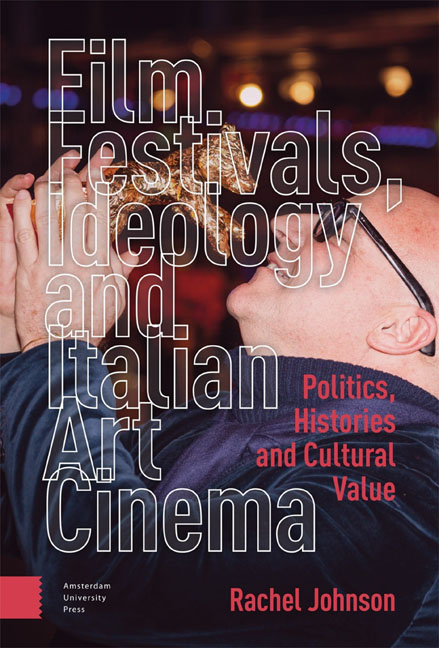Conclusion: Da capo senza fine
Published online by Cambridge University Press: 13 April 2024
Summary
Abstract: The Conclusion discusses the two universals that European A festivals construct, and on which they stake claims to legitimacy as canon-makers: artistic universality and political universality. Bringing the book's five main case studies into dialogue with a wider corpus of Italian prize-winning films, this chapter summarises and expands prior analyses of the figures of the auteur and the “other,” as well as regimes of taste and difference. Responding to Žižek's (2000, p. 223) claim that “today's Real which sets a limit to resignification is capital,” I argue for a discursive-materialist approach to not only studying film festivals, but seeking just models of film culture and cinephilia.
Keywords: cinephilia, film festivals, decolonization, ideology, discourse, film culture
European A festivals are in the business of creating art cinema. This can take many forms, from festivals’ role in the funding and production of films, through their cultivation of filmmakers via film education programmes and labs, to their facilitation of international film distribution through markets and networking events. I have been concerned with European A festivals’ production of art cinema as a discursive regime, one founded on the imperative (economic as much as representational) to fix the meaning of certain films within a common framework. Through their programming, paratexts, pronouncements and prizes, festivals bring art cinema tentatively into being. This process always fails, giving rise to the cycle of repetition and reproduction that characterises festivals as annual film events—not just festivals, but a series of festival editions, pursuing the same impossible object. It is within the space of this failure and repetition, the space of desire, that ideology emerges. Each repetition brings with it a moment of undecidability, the moment opened up by failure, which is then captured, tamed and taken back up into a dominant system of signification. European A festivals’ construction of art cinema is underpinned by a series of ideological structures, or fantasies, that secure not only the meaning of the films they represent but the power of these institutions themselves—their claims to universality.
- Type
- Chapter
- Information
- Film Festivals, Ideology and Italian Art CinemaPolitics, Histories and Cultural Value, pp. 255 - 268Publisher: Amsterdam University PressPrint publication year: 2023



